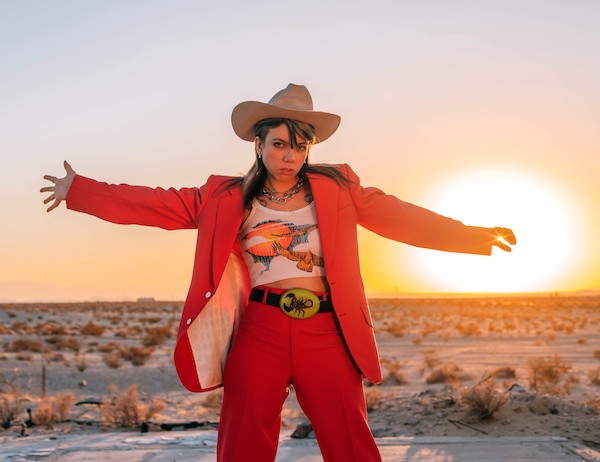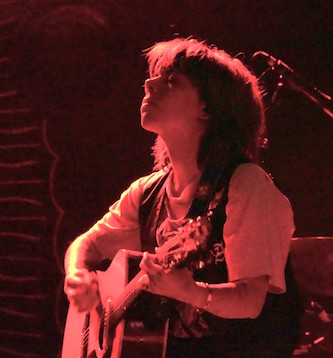Concert Review: Hurray for the Riff Raff — Ringing Loud and Clear
By Paul Robicheau
The Past Is Still Alive hones Alynda Segarra’s songs to an accessible Americana that allows their travelogue-tinged tales to nestle in ways both literal and metaphorical. It’s one of the best records of the nascent new year.

Hurray for the Riff Raff’s Alynda Segarra. Photo: Tommy Kha
As the vehicle of singer/songwriter Alynda Segarra, Hurray for the Riff Raff champions the outsider. It’s a world that Segarra knows well. Puerto Rican in heritage and radicalized as a teenager drawn to punk and queer spaces, they left the Bronx to hop trains and forage for sustenance, finding a home in New Orleans and launching the Riff Raff as a folky outlet that grew in scope.
Now, with their ninth album, The Past Is Still Alive, the 36-year-old Segarra may have their best shot at more mainstream appeal — even as the record crystallizes candid snapshots from the singer’s unconventional history.
Recorded shortly after the death of their father, The Past Is Still Alive hones Segarra’s songs to an accessible Americana that allows their travelogue-tinged tales to nestle in ways both literal and metaphorical. Segarra sounds relaxed, and their songs breathe. It’s one of the best records of the nascent new year.
If the album has a slight drawback, producer Brad Cook’s sparse, hazy touch accents a sameness in Segarra’s aching alto across its early tunes, though that comfortable tone also magnifies the focus on Segarra’s more difficult lyrics.
That dichotomy initially held true on Wednesday for an intimate sold-out crowd at the Sinclair. Segarra and touring mates Yan Westerlund (drums), Parker Gregory (guitar), and opening act NNAMDI (bass) nonchalantly served all 10 songs from The Past Is Still Alive, comprising two-thirds of their 72-minute set, beginning with the album’s first three numbers.
“You don’t have to die if you don’t wanna die. You can take it all back in the nick of time,” Segarra sang in “Alibi,” its easy glide belying the song’s subject of addiction. For “Buffalo,” they both pulled back on the tempo and lingered in vocal delivery, analogizing a relationship to endangered species. “Hawkmoon” perked up as they reminisced on a mind-opening first encounter with a trans woman on the road. But for fans getting a first encounter with the material, that initial stretch could have passed by in a low-lit, pleasant blend, at least thankfully spiced by Gregory’s mournful slide guitar or gritty electric leads.

Hurray for the Riff Raff’s Alynda Segarra at the Sinclair. Photo: Paul Robicheau
Westerlund’s pumping swing on the drums helped lift “Rhododendron,” from Hurray for the Riff Raff’s electronics-dappled previous album Life on Earth. And his subtle rhythmic colorations impressed as material from The Past Is Still Alive hit an early apex with “Colossus of Roads,” where Segarra ruminated on the need for safe spaces for queer people (“I know that it’s dangerous, but I wanna see you undress”) and “Snake Plant (The Past Is Still Alive)” about their rail-riding days with fellow outsiders. Backup vocals by Gregory and NNAMDI went unheard in the sound mix, but when Segarra resolved “Nothing will stop me now!” in the chorus, the crowd responded with cheers.
The set quietly reached a later peak with “Hourglass” (“I always feel like a dirty kid,” she sang. “I used to eat out of the garbage”) and the simply strummed waltz “The World Is Dangerous,” a sad love song about dreaming and moving on, augmented on the new record by Conor Oberst’s harmony vocal.
But the night’s most impactful number might have been “The Body Electric,” an older number Segarra presented as relevant amid today’s atrocities and suffering. “Delia’s gone, but I’m settling the score,” they sang in that revised murder ballad, the band’s finally unleashed dynamics bolstering its affirmation.
Dynamics were oddly bypassed in an understated cover of the Pixies’ “Wave of Mutilation” to start the encore. But the night reached a triumphant conclusion with “Pa’lante” (whose title translates to “Forward!”) from 2017’s excellent The Navigator, a broadly painted folk-blues opera where Segarra reflected on their Latin roots both musically and in a nod to the immigrant experience.
“I just want to prove my worth on the Planet Earth and be something,” they declared, putting aside their acoustic guitar to wander the stage, gesturing with sudden animation and projection more akin to a Broadway play. They cried “Pa’lante” to “all who had to hide” or “lost their pride,” calling out to everyone from family members to the children and “poets of Palestine.”
Toward the end, Segarra switched off to grab Gregory’s microphone and sure enough, their voice could no longer be heard in the mix. By that point anyway, their message — and perspective — rang loud and clear.
Paul Robicheau served more than 20 years as contributing editor for music at the Improper Bostonian in addition to writing and photography for the Boston Globe, Rolling Stone, and many other publications. He was also the founding arts editor of Boston Metro.
Tagged: "The Past is Still Alive", Alynda Segarra, Americana, Hurray For The Riff Raff
